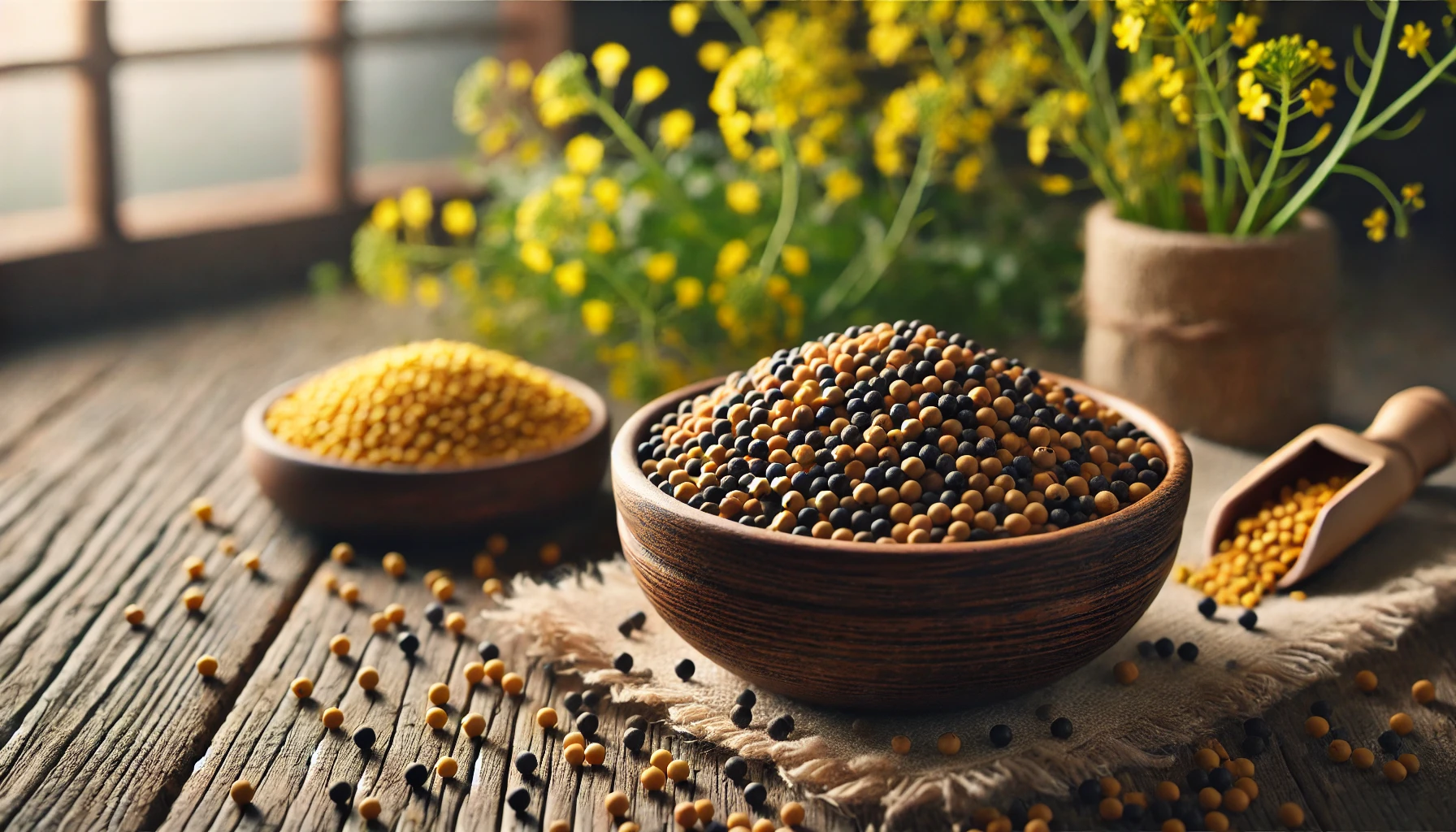Mustard seeds have played a vital role in culinary and medicinal practices for centuries. These small yet powerful seeds are derived from the mustard plant, a member of the Brassicaceae family. Known for their pungent flavor and impressive health benefits, mustard seeds are a staple in kitchens and health regimens around the world. In this comprehensive guide, we’ll explore everything you need to know about mustard seeds, from their nutritional value to their versatile uses.
What Are Mustard Seeds?
Mustard seeds are small, round seeds that come in three main varieties: yellow (white), brown, and black. Each type offers a unique flavor profile and is used differently in cuisines. While yellow mustard seeds are milder and commonly used in prepared mustard, brown and black seeds are spicier, making them popular in Indian and Middle Eastern dishes.
Packed with essential nutrients, mustard seeds have been celebrated not only for their culinary versatility but also for their numerous health benefits.
Nutritional Value of Mustard Seeds
Despite their tiny size, mustard seeds are nutrient powerhouses. They are rich in vitamins, minerals, and beneficial plant compounds, offering significant health benefits. Here’s a quick overview of their nutritional content:
- Protein: A valuable plant-based protein source.
- Healthy Fats: Contains omega-3 fatty acids, which support heart health.
- Vitamins: High in vitamin B-complex and vitamin E.
- Minerals: Includes selenium, magnesium, calcium, and iron.
- Fiber: Promotes digestive health and helps maintain healthy cholesterol levels.
These nutrients contribute to the overall well-being of individuals who incorporate mustard seeds into their diets regularly.
Health Benefits of Mustard Seeds
Promotes Heart Health
Mustard seeds are known for their heart-protective properties. Their omega-3 fatty acids help reduce inflammation, while the presence of selenium supports cardiovascular health. Moreover, their fiber content aids in managing cholesterol levels, which is crucial for maintaining a healthy heart.
Supports Digestive Health
Rich in dietary fiber, mustard seeds promote healthy digestion. They help regulate bowel movements and prevent constipation. Additionally, their natural compounds stimulate the production of digestive enzymes, enhancing nutrient absorption.
Boosts Immunity
Mustard seeds contain powerful antioxidants, including selenium and vitamin E. These nutrients help protect cells from oxidative stress, thereby strengthening the immune system. Regular consumption can improve the body’s ability to fight off infections.
Relieves Pain and Inflammation
For centuries, mustard seeds have been used in traditional medicine to alleviate pain and inflammation. Their anti-inflammatory properties make them effective in managing conditions like arthritis and muscle soreness. Mustard seed oil, in particular, is often applied topically to provide relief.
Regulates Blood Sugar Levels
Mustard seeds can play a role in managing blood sugar levels. Their fiber content helps slow the absorption of glucose, preventing sudden spikes in blood sugar. This makes them beneficial for individuals with diabetes or those looking to maintain stable energy levels.
Culinary Uses of Mustard Seeds
In Spice Blends
Mustard seeds are a key ingredient in many spice blends, including curry powders and pickling spices. They add depth and heat to dishes, enhancing the overall flavor profile.
Tempering and Tadka
In Indian cuisine, mustard seeds are often used in the tempering process, also known as tadka. When heated in oil, the seeds release their nutty and pungent aroma, providing a flavorful base for dals, curries, and vegetable dishes.
Mustard Condiments
Yellow mustard seeds are widely used to create mustard condiments, a staple in Western cuisine. From classic yellow mustard to Dijon and whole grain varieties, these condiments add a tangy and spicy kick to sandwiches, dressings, and marinades.
Pickling and Preserving
Mustard seeds play an essential role in pickling. Their pungent flavor helps preserve vegetables while adding a zesty taste. They are also used in brines and marinades to enhance the flavor of meats and fish.
Mustard Seeds in Traditional Medicine
Mustard Plasters
In traditional remedies, mustard plasters have been used to relieve chest congestion and respiratory issues. Made by mixing powdered mustard seeds with water, these plasters generate heat when applied to the skin, promoting blood circulation and easing discomfort.
Digestive Aids
Mustard seeds have been used as a natural remedy for indigestion and bloating. Consuming a small amount of raw mustard seeds can stimulate digestion and provide quick relief from discomfort.
Skin and Hair Health
The oil extracted from mustard seeds is a popular choice for skin and hair care. It is believed to promote hair growth, prevent dandruff, and nourish the scalp. For skin, mustard seed oil is used as a massage oil to improve circulation and maintain a healthy glow.
How to Incorporate Mustard Seeds into Your Diet
Incorporating mustard seeds into your diet is simple and versatile. Here are some ideas:
- Salad Dressings: Add ground mustard seeds to homemade dressings for an extra kick.
- Roasted Vegetables: Toss vegetables with mustard seeds and roast for a flavorful side dish.
- Soups and Stews: Enhance the taste of soups and stews by adding whole mustard seeds.
- Breads and Crackers: Use mustard seeds in bread or cracker recipes for added crunch and flavor.
Storing Mustard Seeds Properly
To maintain their freshness and potency, mustard seeds should be stored correctly. Here’s how:
- Airtight Containers: Store them in airtight containers to prevent exposure to moisture and air.
- Cool, Dark Place: Keep them in a pantry or cupboard, away from direct sunlight.
- Refrigeration: For prolonged storage, especially for ground mustard, refrigeration is recommended.
Potential Allergies and Side Effects
While mustard seeds are generally safe, they may cause allergic reactions in some individuals. Symptoms can include itching, swelling, and difficulty breathing. It is essential to consult a healthcare provider if any adverse reactions occur. Additionally, consuming large quantities may cause gastrointestinal discomfort, so moderation is advised.
FAQs
What are the different types of mustard seeds?
There are three main types: yellow (mild), brown (moderately spicy), and black (the spiciest). Each type has unique culinary applications.
Are mustard seeds gluten-free?
Yes, mustard seeds are naturally gluten-free, making them suitable for individuals with gluten sensitivities or celiac disease.
Can mustard seeds help with weight loss?
Due to their fiber and protein content, mustard seeds can promote satiety and help control appetite, aiding in weight management when consumed as part of a balanced diet.
How can mustard seeds be used in skincare?
Mustard seed oil is often used as a massage oil to improve circulation and maintain healthy skin. It can also be used in DIY face masks for a natural glow.
Is mustard seed oil safe for cooking?
Yes, mustard seed oil is widely used in cooking, particularly in Indian cuisine. However, it should be used in moderation due to its strong flavor.
Can mustard seeds cause any side effects?
While generally safe, excessive consumption may lead to digestive discomfort. Some individuals may also experience allergic reactions.
How do mustard seeds compare to other spices in terms of health benefits?
Mustard seeds are unique in their combination of anti-inflammatory properties, heart health benefits, and digestive support, making them a valuable addition to any spice rack.
Conclusion
Mustard seeds may be small, but they pack a powerful punch in terms of flavor and health benefits. From promoting heart health to supporting digestion, these seeds offer a range of advantages that can enhance your overall well-being. Their versatility in the kitchen makes them a favorite among home cooks and professional chefs alike. By incorporating mustard seeds into your daily routine, you can enjoy their rich nutritional profile and unique taste, all while reaping the health benefits they provide.






